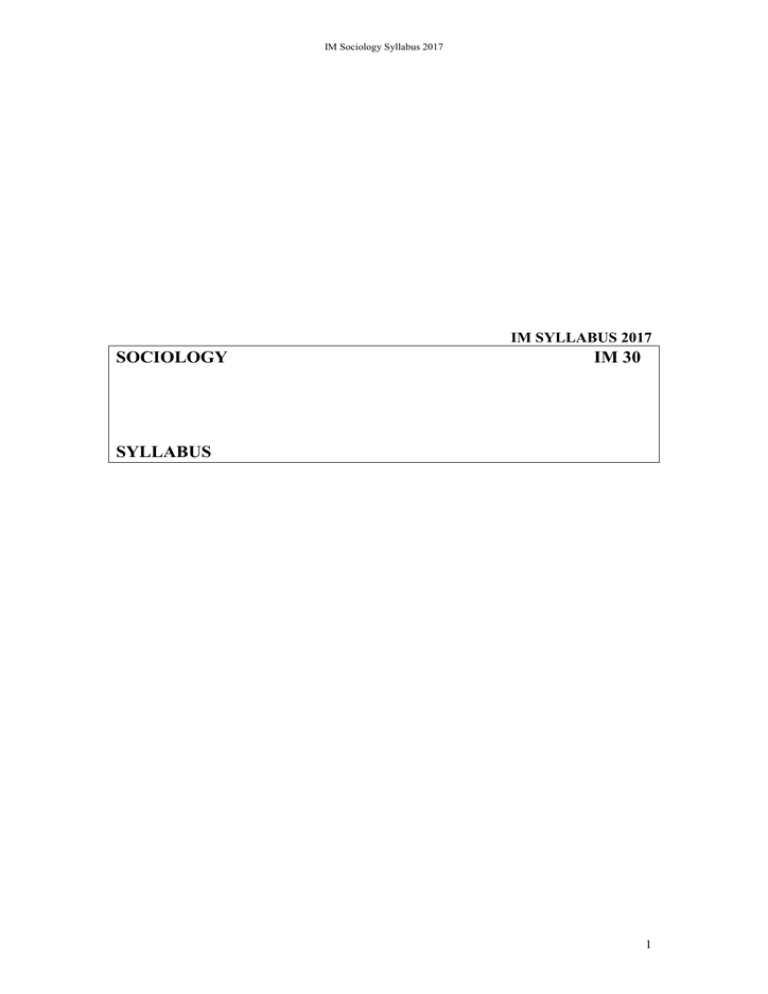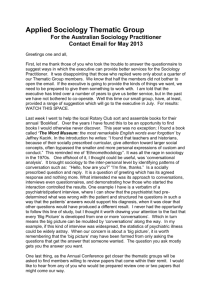SOCIOLOGY IM 30 SYLLABUS
advertisement

IM Sociology Syllabus 2017 IM SYLLABUS 2017 SOCIOLOGY IM 30 SYLLABUS 1 IM Sociology Syllabus 2017 Sociology IM30 (Available in September) Syllabus Preamble The syllabus aims to provide students with a grounding in sociology, based on a range of thematic areas that represent some of the key contemporary fields of inquiry in the discipline. The syllabus content is intended to function as a stand-alone post-secondary area of study. The syllabus is closely based on two recent, authoritative, and widely-used textbooks. Exam candidates will be able to answer any question in the exam paper based on their understanding and application of the relevant sections in the textbooks. The syllabus is closely based on two recent, authoritative, and widely-used textbooks. Exam candidates will be able to answer any question in the exam paper based on their understanding and application of the relevant sections in the textbooks. Exam questions will be topic-specific and limited to the topics included in the syllabus. Students are encouraged to do their private reading and develop their ideas beyond the materials included in the textbooks. Assessment Objectives The student at Intermediate level will be subject to an assessment as outlined in the scheme of assessment. The assessment will target knowledge and understanding, application, and basic analysis and evaluation. The objectives of this assessment are to assess: • • • • • basic knowledge of sociological theory and concepts; logical and coherent arguments based on sociological theory and knowledge; ability to apply knowledge of sociology to a range of issues and real-life contexts; ability to present arguments and draw conclusions based on sociological knowledge; ability of make basic connections between different topics outlined in the thematic areas. Scheme of Assessment There will be one three-hour paper. Question 1 is a compulsory question and will be based on the Core Thematic Area. Question 1 will be structured into 3 to 6 components and the marks allocated to each component will be indicated in brackets. The paper will contain four other questions from which candidates will choose two. Therefore, candidates will answer three questions in total. All questions carry equal marks. Thematic Areas and Themes There is one core thematic area and four additional thematic areas. Core Thematic Area: Culture and Identity Conceptions of culture and identity: the meaning and importance of culture; meanings of and changing distinctions between high and mass, popular and low cultures; the concept of identity; the social causes and construction of identity; different types of identity. 2 IM Sociology Syllabus 2017 Socialization: resocialisation; nature vs nurture; the social construction of self and identity; primary and secondary socialization. Identities in practice: social class and its contemporary forms and relevance; gender and identity; sexuality and identity; ethnicity and identity; nationality and identity. Leisure and consumption: consumption and identity – postmodernist approaches; tourism and the ‘tourist gaze’; identities, lifestyle, and choice. Thematic Area 1: Family Theoretical perspectives: Functionalism; New Right; Marxism; feminism; postmodern theories. Diversity and change in families and households: Divorce and separation; diversity in family patterns; new partnerships. Balancing work and care; intimate violence. Thematic Area 2: Religion Key concepts: What is religion?; religion in classical sociology; the secularization thesis; beyond secularization. Religion in context I: Religious organizations. Thematic Area 3: Media and Communication Theoretical perspectives: Functionalism; conflict theories; symbolic interactionism; postmodern theories. Audiences and media representations: Audience studies; representation of class, gender, ethnicity, and disability. The global media: Media imperialism. Thematic Area 4: Welfare and Social Policy Definitions and concepts: Absolute poverty; relative poverty. Social exclusion. Theories of welfare: Marxism; feminism; social democratic theories; New Right; Esping-Anderson’s ‘three worlds of welfare’. Text books Anthony Giddens and Philip W. Sutton, 2013, Sociology, 7th edition, Polity Press. ISBN 9780745652931 Ken Browne, 2015, Sociology for AQA Volume 1, 5th edition, Wiley-Blackwell. ISBN 9780745691305 3


